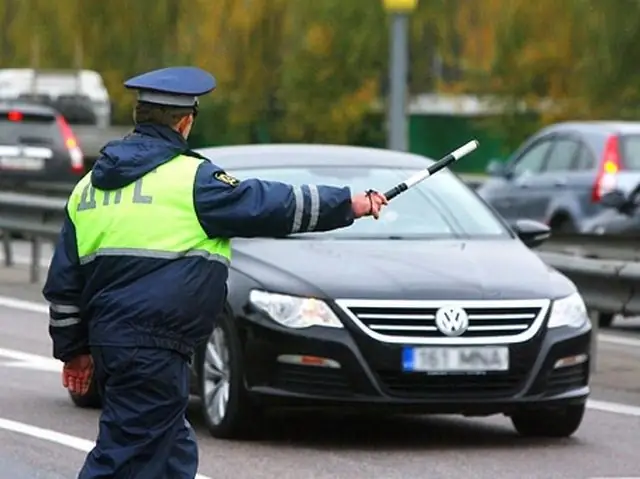- Author Maria Gibbs gibbs@autolifeadvice.com.
- Public 2023-12-16 03:05.
- Last modified 2025-01-22 17:48.
Sometimes it is enough to show conscientiousness and respect for road users. Responsible attitude in many cases makes it possible to exclude the possibility of violation of the rules as such and the application of administrative sanctions to the driver. Do not create problems for yourself!

Imposition of an administrative fine of the traffic police
It so happened now that every time people are being sought out who show disrespect for their country, the laws of the state and road users. Perhaps the point is in the prevailing worldview, and maybe also in a bad upbringing. So, some offenders, for various reasons, fundamentally do not pay for the fines imposed by the State Traffic Inspectorate for administrative offenses, essentially not realizing the seriousness of the consequences of such a situation.
Consequences of Missing the Deadline for Payment of the Fine
The decision on the imposition of an administrative fine is an executive document. It becomes legally binding upon the expiration of ten days from the date on which a copy was received by the offender. A sixty-day period is provided for the payment of the fine from the date of entry into force of such a resolution. If the deadline is missed, the offender is due either a double fine of the principal amount (but not less than 1,000 rubles), or an administrative arrest up to fifteen days, or compulsory work for a period of up to fifty hours. Make sure it's a little pleasant.
Compulsory collection by the bailiff service
In addition, upon the expiration of the period established for voluntary payment, the State Traffic Inspectorate has every reason to redirect the outstanding resolution to enforce the amount of the fine to the appropriate department of the bailiff service.
With each new version of the Law on Enforcement Proceedings, the range of powers of the bailiff service to collect debts is significantly expanding. The initial penalty in respect of the debtor, which the bailiffs-executors have the right to use, perhaps, will be the enforcement fee. It is subject to collection from persons who, within the specified time limit, did not fulfill their payment orders. Typically, this period is five days. The amount of the fee is seven percent of the total debt, but no less than five hundred rubles. To top it all off, the bailiffs are authorized to check the property status of the defaulter, including his place of residence. Registration and regulatory authorities, as well as banking institutions are required to provide them, upon request, with comprehensive data on the availability of all types of income, funds on accounts, vehicles, industrial equipment, all types of real estate. So, no matter how much one wants, the possession of any property cannot be hidden.
Consequences of obstruction of the lawful activity of the bailiff service
But this is not the whole list of sanctions. If you suddenly find it convenient to obstruct the work of the department of the bailiff service or ignore their legitimate requirements, please note that the Code of Administrative Offenses of the Russian Federation defines a significant number of norms, guided by which, the bailiff-executor has the right to draw up protocols on administrative offenses for the perpetrators. In addition to everything, for officials, in contrast to citizens, a stricter responsibility is established, the amount of fines is significantly higher.






